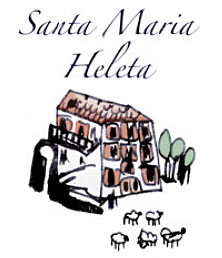
The song of Ursúa
Can a song be heard for more than six hundred years? The song of Urtsua is a composition compiled in Baztan at the beginning of the 20th century by the folklorist Azkue. It tells a tragic story that took place in the tower of Urtsua, in Arizkun, which is said to be one of the oldest in the valley. The lyrics may date back to the 13th or 14th centuries.
The owner of the tower was betrothed to a young woman from the house of Lantaina, north of the Pyrenees. The legend opens with a dialogue between the bride, Joan, and her priest brother, Baptist, shortly before she leaves her native home to marry. Her brother realizes that she is pregnant, and Juana begs him to keep the secret, while lamenting her fate: she would not want to go to Urtsua. However, the wedding takes place and the husband soon notices his wife's condition. He explains to her that, before starting their life together, she should go to pray to the Shrine of Our Lady of Fair Love of Santa Ana, property of the tower and very close to it. Once there, the Lord of Urtsua kills her, and asks a servant to prepare a horse for her to flee, taking the precaution of nailing the horseshoes on backwards. The narration ends by lamenting that Juana, veiled in the tower, has departed without saying goodbye. It is not surprising that for some time it was forbidden to sing it, since the owners of Urtsua did not want the story of the crime to spread.
The song attracted the attention of scholars because of its profound beauty and the perfect match between form and content. But it also raised a number of questions: when and by whom was it composed? Was it sung at the court of Olite before the kings? Was Basque used in that environment? Was the author a woman?
This song and the uses made of it contain a particular synthesis of the historical trajectory of the kingdom of Navarre: the power of the small nobility, the proximity of the court, the linguistic diversity, the contacts between the north and south of the Pyrenees, the role assigned to women, the marriages arranged between allied lineages, the persistence of the oral tradition.
Hello Juana, my sister,
I have heard some news,
sister Juana.
So what have you heard, Mr.
Brother Baptist?
That you seem to be
pregnant, Sister Joan.
How have you known me?
my brother, sir?
In that your waist has grown
your waist and your shortness has shortened.
Seven new mills,
eight white palaces,
not even for all that
I don't want to go to Urtsua.
Urtsua has beautiful
windows, Lantana even
even more beautiful; the daughter of
Lantana is dead in Urtsua.
In Urtsua the deceased,
found in Santa Ana,
without saying goodbye has left
out of the house.
Pamplona
leave Navarra
Baztan
22-24 May 2019
Organised by:

Sponsor:

In collaboration with:

